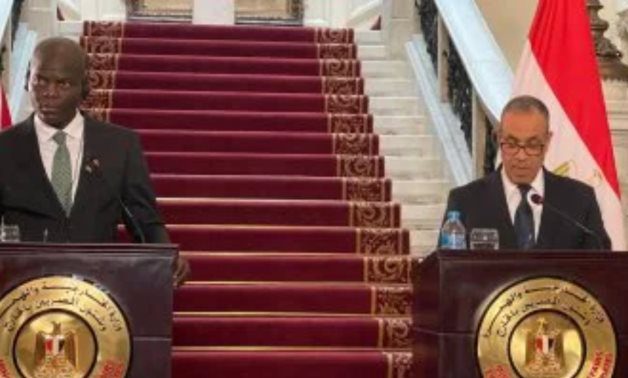Egyptian Minister of Foreign Affairs and Immigration, Badr Abdelatty, and South African Minister of International Relations and Cooperation, Ronald Lamola, convened in Cairo on Thursday to address significant international and regional issues. Following their meeting, both ministers held a press conference where they reaffirmed the enduring partnership between their nations and discussed key topics, from Gaza’s humanitarian crisis to enhancing Africa’s infrastructure and security.
During the press briefing, Minister Abdelatty underscored Egypt’s strong alignment with South Africa on the Palestinian cause, expressing profound gratitude for South Africa’s support.
“We agreed on the need to immediately stop the Israeli aggression on the Gaza Strip and put an end to the unprecedented humanitarian tragedy in the Strip. We affirm in this regard Egypt’s full appreciation for South Africa’s positions in support of the rights of the Palestinian people,”
Abdelatty said.
The ministers further examined regional tensions, including recurring violence in the West Bank and Lebanon, as well as the crises impacting Libya, Sudan, Somalia, the Horn of Africa, the Great Lakes region, and the Lake Chad Basin. Both nations committed to enhancing their collaboration to confront these challenges.
“We touched on the repeated attacks in the West Bank, in addition to the Israeli aggression on Lebanon, the crises in Libya and Sudan, the situation in Somalia, the Horn of Africa, the Great Lakes regions and the Lake Chad Basin,”
Abdelatty explained, signaling the broad scope of their regional concerns.
A significant theme throughout the conference was the mutual desire to combat terrorism and organized crime. Abdelatty emphasized the importance of a unified approach across Africa, advocating for a multi-dimensional strategy that addresses security, development, and ideological roots of extremism. He added that such an approach should seek to eliminate organized crime, which poses a persistent threat to the continent.
“We agreed again on the need to continue joint efforts aimed at containing and defeating terrorism by adopting a comprehensive strategy for various security, development and intellectual dimensions, in addition to eliminating organized crime that threatens the security and safety of African countries and societies,”
he noted.
South African Minister Ronald Lamola also highlighted the shared vision between Egypt and South Africa, expressing an eagerness to elevate their bilateral relationship.
“There is a convergence of visions with Egypt regarding supporting bilateral cooperation,”
Lamola remarked, underscoring the alignment of their nations’ objectives.
Lamola expressed South Africa’s appreciation for Egypt’s endeavors to achieve a ceasefire in Gaza, an issue that both ministers affirmed requires immediate international intervention.
“We appreciate Egypt’s efforts to stop the ceasefire in the Gaza Strip,”
he added, reiterating the urgency of halting violence and alleviating humanitarian suffering in the region.
The conversation then turned to economic collaboration. Lamola discussed South Africa’s ambitions to advance its relations with Egypt to a strategic level, specifically in the areas of trade and investment.
“We look forward to moving the level of relations with Egypt to a strategic partnership, and we are working with Egypt to support increasing investments and trade between the two countries,”
Lamola stated, reflecting both nations’ aspirations for greater economic integration.
Abdelatty echoed these sentiments, announcing Egypt’s commitment to enhancing bilateral cooperation with South Africa. He highlighted South Africa’s forthcoming G20 presidency as an opportunity to promote African development issues on the global stage.
“We agreed on the importance of supporting African development issues on the international agenda in light of South Africa’s upcoming presidency of the G20,”
Abdelatty shared, emphasizing the significance of advocating for Africa within powerful international forums.
One of the key projects the two leaders discussed was the Cairo-Cape Town land link, an infrastructure initiative designed to enhance north-south connectivity across Africa. Abdelatty described this project as a vital milestone in Egypt-South Africa relations, noting its potential to foster a strategic partnership between the two countries and align with the African Union’s goals.
“The Cairo-Cape Town land link project is one of the important signs in bilateral and continental cooperation between Egypt and South Africa, as it enhances the link between the north and south of the continent,”
Abdelatty explained, emphasizing its role in supporting the broader infrastructure connectivity agenda of the African Union.
The ministers also discussed collaborative efforts in reforming and strengthening the African Union, as well as fortifying the role of BRICS member states to address critical issues within Africa. Their shared goal, they stated, was to face the formidable challenges threatening the continent’s stability, particularly in peace and security, while seizing opportunities for meaningful change.
“The prospects for coordination and joint cooperation between the two countries include reforming and developing the African Union, in addition to enhancing the role of the BRICS member states in order to confront the serious challenges facing the continent, especially in the areas of peace and security and ways to seize the opportunities inherent in the two countries in order to bring about serious changes in our reality,”
Abdelatty affirmed.

















